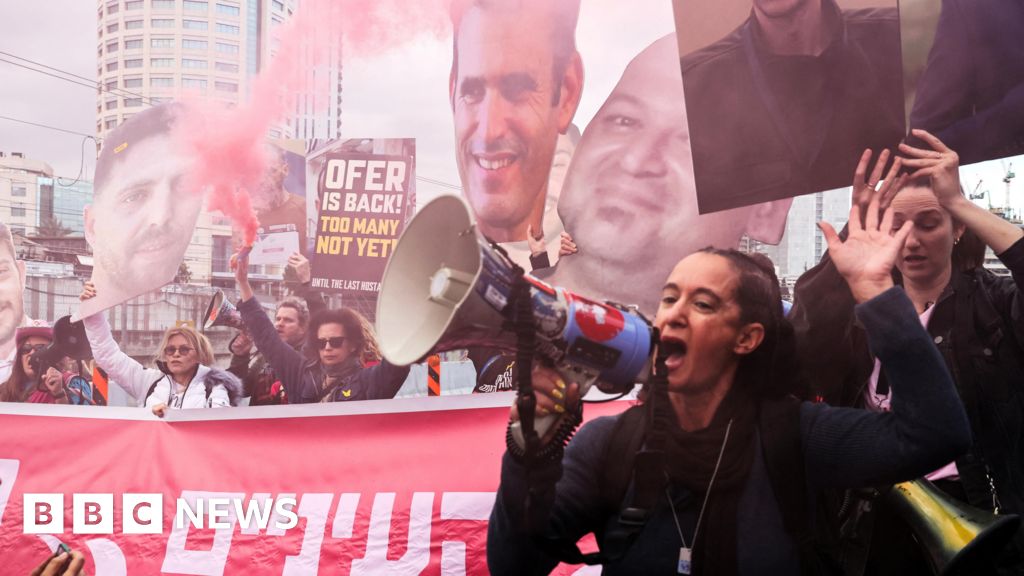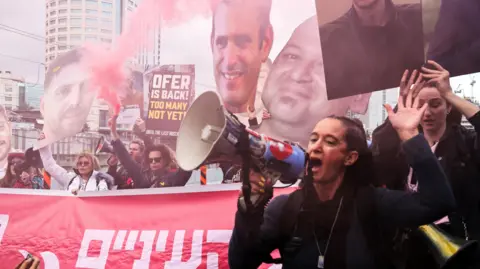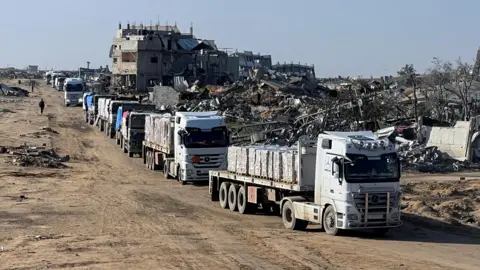
On the Streets of Tel Aviv, Families of Hostages Rally for Their Release

Reuters
Families of Israeli hostages held by Hamas gathered on a Tel Aviv highway on Thursday, passionately demanding action for the release of their loved ones.
In a hopeful declaration, Hamas stated its intention to adhere to the Gaza ceasefire agreement with Israel, pledging to continue releasing hostages as agreed upon. This announcement has raised hopes of preventing the resurgence of conflict.
After discussions in Cairo, the Palestinian militant group indicated that Egyptian and Qatari mediators would help “remove obstacles” to ensure the deal’s progress.
Although Israel has not formally responded, reports from Egypt and Qatar suggest that both parties are dedicated to moving forward with the ceasefire agreement.
Israel has warned that if Hamas does not return hostages by Saturday, the ceasefire could be terminated. Conversely, Hamas claimed it had delayed releases due to alleged violations by Israel.
Hamas pointed to Israel’s failure to provide the agreed-upon levels of crucial humanitarian aid, which Israel has denied. The group’s threats led US President Donald Trump to suggest that Israel should abandon the ceasefire unless all hostages were returned by the deadline.
Israeli Prime Minister Benjamin Netanyahu echoed Trump’s sentiments, asserting that if the hostages were not returned by Saturday noon (10:00 GMT), military actions would resume until Hamas was defeated.
However, conflicting messages emerged regarding whether the demand applied to all 76 hostages or just the three set to be released this weekend.
On Wednesday, an Egyptian security source informed the BBC that Egypt and Qatar were intensifying diplomatic efforts to salvage the ceasefire. Hamas leader Khalil al-Hayya arrived in Cairo for talks with Egyptian intelligence officials.
Hamas announced that discussions were focused on fulfilling all aspects of the agreement, particularly concerning the delivery of essential items such as medical supplies and shelter. They described the negotiations as “positive,” affirming their commitment to the agreed timeline for hostage exchanges.
Egyptian state media reported that obstacles had been successfully navigated, and both Israel and Hamas would adhere to the ceasefire terms. Al Jazeera also highlighted that essential supplies, including mobile homes and heavy machinery, would be permitted into Gaza.
Yet, Israeli officials dismissed as “fake news” reports regarding the delivery of supplies, asserting there was no coordination for such actions.

Reuters
Since the ceasefire began on January 19, hundreds of aid trucks have successfully passed into Gaza each day.
The initial phase of the ceasefire is set to last six weeks, facilitating the exchange of 33 Israeli hostages for around 1,900 Palestinian detainees. Thus far, 16 Israeli hostages have been freed since the ceasefire commenced, alongside five Thai hostages released outside the terms of the agreement.
There are 17 more Israeli hostages slated for release in the upcoming weeks, comprising two children, one woman, five men over 50, and nine men under 50. Although both parties acknowledge that eight hostages are deceased, only one has been publicly named.
Discussions for the subsequent phase of the ceasefire, which will involve the release of 43 remaining hostages, an Israeli withdrawal, and a permanent ceasefire, have yet to commence.
This agreement has allowed Israeli forces to pull back from densely populated areas in Gaza, enabling hundreds of thousands of displaced Palestinians to return home and facilitating the entry of aid into the region.
The conflict escalated after an unprecedented attack by Hamas on October 7, 2023, leading to approximately 1,200 deaths and 251 hostages taken. Since then, over 48,230 individuals in Gaza have reportedly lost their lives, as indicated by the Hamas-run health ministry.
Multiple displacements have impacted Gaza’s population, with estimates suggesting that nearly 70% of structures have been damaged or destroyed. Essential systems for healthcare, water, sanitation, and hygiene have collapsed, alongside severe shortages in food, fuel, medication, and shelter.









